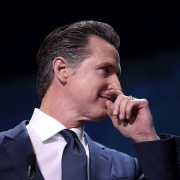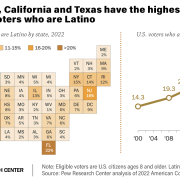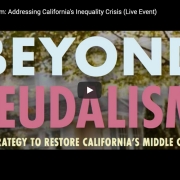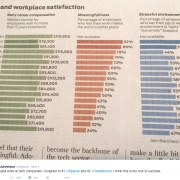California’s Economy is Weaker Than it Looks
Whisper it, but the $45 billion surplus Gavin Newsom has projected for California next year isn’t quite what it seems. In fact, the bulk of that surplus is largely due to the earnings of a few giants such as Google, Apple and Meta (formerly Facebook), as well as a handful of IPOs.
This inconvenient truth hasn’t stopped the Governor from proposing a record-high $286.4 billion budget that will focus on education, health spending for undocumented residents, and expanding the state’s already massive social spend.
Indeed, even with a surplus, the state legislature seems determined not to lower taxes but to raise them. Newsom plans to implement a single payer health care system funded by massive new taxes on business and higher income revenues, raising what is already the nation’s highest rate. On top of that, the legislature seems ready to impose other wealth taxes on the very rich who keep the state afloat.
Yet the reliance on the elites — the 1% who account for half the state’s income tax — could prove troubling once the current stock market boom ends, and the IPO picture darkens. The state tax and regulatory regime has already kneecapped most other sectors of the economy, including both blue collar industries like manufacturing, energy and construction. And much of this has been accelerated by a growing exodus of companies, including such iconic firms as Tesla, Oracle, HP Enterprises, Charles Schwab, Bechtel, Parsons Engineering, and others. Meta has reportedly purchased thirty-three floors in an Austin high rise.
Despite professing to be the start-up capital of America, California’s leaders simply ignore or dismiss any notion of economic peril. But the reality is stark: this is a state that suffers the country’s highest cost-of-living adjusted poverty rate, the largest gap between the middle class and the rich, among the most crowded housing, and the second lowest homeownership rate. Post-pandemic it also has the nation’s highest unemployment rate.
These facts are rarely discussed in the predictably pro-Newsom media. The party line is that such attacks reflect the political bias of Right wing “haters”. Yet what California needs is not media or academic shills, but a willingness to confront the state’s emerging neo-feudal structure that, amid unprecedented wealth, has done little for most residents. Only a course correction, and change of consciousness, can restore the state to its former greatness.
This piece first appeared at UnHerd.
Joel Kotkin is the author of The Coming of Neo-Feudalism: A Warning to the Global Middle Class. He is the Roger Hobbs Presidential Fellow in Urban Futures at Chapman University and Executive Director for Urban Reform Institute. Learn more at joelkotkin.com and follow him on Twitter @joelkotkin.
Homepage photo: Gage Skidmore, via Flickr under CC 2.0 License.

 Gage Skidmore, used under CC 2.0 License
Gage Skidmore, used under CC 2.0 License





